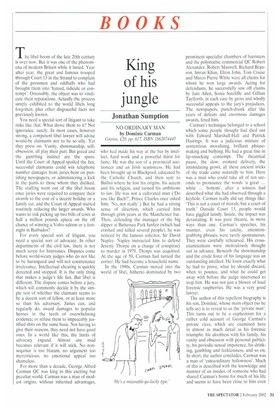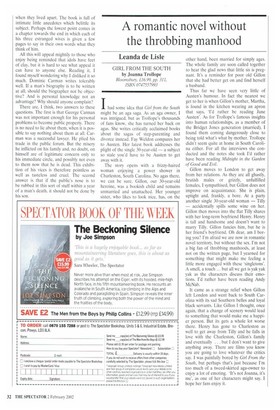King of his jungle
Jonathan Sumption
NO ORDINARY MAN by Dominic Carman
Grania, £20. pp. 617, ISBN 1862074445
T
he libel boom of the late 20th century is over now. But it was one of the phenomena of modern Britain while it lasted. Year after year. the great and famous trooped through Court 13 in the Strand to complain of the pressmen and oddballs who had brought them into 'hatred, ridicule or contempt'. Ostensibly, the object was to vindicate their reputations. Actually the process simply exhibited to the world libels long forgotten, plus other disgraceful facts not previously known.
You need a special sort of litigant to take risks like that. What drove them to it? Not ignorance, surely. In most cases, however strong, a competent libel lawyer will advise would-be claimants not to be so silly. Yet they press on. Vanity, showmanship, selfobsession, all play their part. But greed and the gambling instinct are the spurs. Until the Court of Appeal spoiled the fun, successful claimants could win telephone number damages from juries bent on punishing newspapers, or administering a kick in the pants to those whom they disliked. The stuffing went out of the libel boom once juries were required to compare their awards to the cost of a decent holiday or a family car, and the Court of Appeal started routinely reducing the larger awards. Who wants to risk picking up two bills of costs at half a million pounds apiece on the off chance of winning a Volvo saloon or a fortnight in Barbados?
For every special sort of litigant, you need a special sort of advocate. In other departments of the civil law, there is not much scope for histrionics. Disputes come before world-weary judges who do not like to be harangued and will not countenance irrelevance. Intellectual cheating is quickly detected and stopped, It is the only thing that makes a judge's life fun. But libel is different. The dispute comes before a jury, which will commonly decide it by the simple test of whether the claimant seems to be a decent sort of fellow, or at least more so than his adversary. Juries can, and regularly do, award damages to popular heroes in the teeth of overwhelming evidence; or refuse them to impeccably justified shits on the same basis. Not having to give their reasons, they need not have good ones. In a world like this, the limits of advocacy expand. Almost any mud becomes relevant if it will stick. No nonsequitur is too blatant, no argument too meretricious, no emotional appeal too shameless.
For more than a decade, George Alfred Carman QC was king in this exciting but peculiar world. Carman was a man of modest origins, without inherited advantages,
who had made his way at the bar by intellect, hard work and a powerful thirst for fame. He was the son of a provincial auctioneer and an Irish seamstress. He had been brought up in Blackpool, educated by the Catholic Church, and then sent to Balliol where he lost his origins, his accent and his religion, and turned his ambitions to law. He was not a cultivated man ('Do you like Bach'?', Prince Charles once asked him; 'No, not really..) But he had a strong sense of direction, which carried him through grim years at the Manchester bar. Then, defending the manager of the big dipper at Battersea Park funfair (which had crashed and killed several people), he was noticed by the famous solicitor, Sir David Napley. Napley instructed him to defend Jeremy Thorpe on a charge of conspiracy to murder in 1979. Thorpe was acquitted. At the age of 50, Carman had turned the corner. He had become a household name.
In the 1990s, Carman moved into the world of libel, hitherto dominated by two prominent specialist chambers of barristers and the polyrnathic commercial QC Robert Alexander. Robert Maxwell. Richard Branson, Imran Khan, Elton John, Tom Cruise and Marco Pierre White were all clients for whom he won large awards. Acting for defendants, he successfully saw off claims by Jani Allen, Sonia Sutcliffe and Gillian Tay[forth, in each case by gross and wholly successful appeals to the jury's prejudices. The newspapers, punch-drunk after the years of defeats and enormous damages awards, feted him.
Carman's technique belonged to a school which some people thought had died out with Edward Marshall-Hall and Patrick Hastings. It was a judicious mixture of sententious moralising, brilliant phrasemaking and bullying. He had a great line in lip-smacking contempt. The theatrical pause, the slow, orotund delivery, the intimidating growl, all these ancient tricks of the trade came naturally to him. Here was a man who could take all of ten seconds to pronounce the words 'a great white ... bottom', after a witness had described what she had observed through a keyhole. Carman really did say things like; 'This is not a court of morals, but a court of truth.' Outside Court 13, people would have giggled faintly. Inside, the impact was devastating. It was pure theatre, in more ways than one. Carman's speeches, his manner, even his catchy, attentiongrabbing phrases, were rarely spontaneous. They were carefully rehearsed. His crossexaminations were meticulously thought Out in advance. Beneath the showmanship and the crude force of his language was an outstanding intellect. He knew exactly what he had to prove, what he should discard, when to pounce, and what he could get away with before the judge intervened to stop him. He was not just a blower of loud forensic raspberries. He was a very good lawyer.
The author of this repellent biography is his son, Dominic, whose main object (so he tells us) is to reveal to us the 'private man'. This turns out to be a euphemism for a rather cold account of George Carman's private vices, which are examined here in almost as much detail as his forensic triumphs: his aloofness with his family, his vanity and obsession with personal publicity, his periodic sexual impotence, his drinking, gambling and fecklessness, and so on. In short, the author concludes. Carman was a man of 'extraordinary hollowness'. Much of this is described with the knowledge and manner of an insider, of someone who had shared Carman's home for much of his life and seems to have been close to him even when they lived apart. The book is full of intimate little anecdotes which belittle its subject. Perhaps the lowest point comes in a chapter towards the end in which each of his three estranged wives is given a few pages to say in their own words what they think of him.
All this will appeal mightily to those who enjoy being reminded that idols have feet of clay, but it is hard to see what appeal it can have to anyone else. Reading it, I found myself wondering why I disliked it so much. Dominic Carman writes tolerably well. If a man's biography is to be written at all, should the biographer not be objective? And is personal knowledge not an advantage? Why should anyone complain?
There are, I think, two answers to these questions. The first is that George Carman was not important enough for his personal problems to become public property. There is no need to lie about them, when it is possible to say nothing about them at all. Carman was a successful lawyer. He plied his trade in the public forum. But the misery he inflicted on his family and, no doubt, on himself are of legitimate concern only to his immediate circle, and possibly not even to them now that he is dead. This exhibition of his vices is therefore pointless as well as tasteless and cruel. The second answer is that if the public's nose is to be rubbed in this sort of stuff within a year of a man's death, it should not be done by his son.































































 Previous page
Previous page